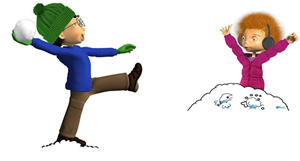Christmas Day is celebrated all around the world in many different ways. Although traditionally a Christian holiday, people from all cultures now celebrate Christmas.
Below you will find lots of information about Christmas and how it is celebrated around the world.
- The true meaning of Christmas
- Christmas traditions
- Christmas in other countries
- Christmas fast facts
- References
A printable PDF of the information on this page is available in the right-hand column.
The true meaning of Christmas
Christmas is traditionally a Christian holiday that celebrates the birth of Jesus Christ over 2000 years ago.
Most people know the story of Joseph and a heavily pregnant Mary arriving in Bethlehem only to find that there was nowhere for them to stay. Eventually, an inn keeper gave them shelter in a stable at the back of his inn. This is where Jesus was born and placed in a manger.
Many modern-day traditions are a result of this event, including gift giving (various people came to visit Jesus and brought gifts) and placing a star at the top of a Christmas tree (it is recorded that a star hovered above the stable and guided people to see Jesus).
Christmas traditions
Gift giving

Exchanging gifts is probably the most popular Christmas tradition. This represents the ‘spirit of giving’ for which Christmas is known. As well as giving to friends and family, it is important to think of people less fortunate than ourselves at this time of year. Many people choose to donate to charities that support work with families who will not receive gifts at Christmas.
Sharing a meal
Another common Christmas tradition is sharing a meal with family or friends. A traditional Christmas meal might consist of a cooked turkey or ham, roasted vegetables and Christmas pudding. This meal originated in countries where December is in winter. In Australia, because December is in summer, many people choose to eat meals that include BBQs (which can be cooked outside), seafood, salads and other things that are great to eat in summer.
There are also other treats to enjoy at Christmas, such as mince pies, candy canes and marshmallow-filled chocolate Santas.
Putting up decorations

Many people decorate their house at Christmas time. The most popular decoration would definitely be a Christmas tree with tinsel, ornaments and maybe even lights. Some people even decorate their whole front yard with lights and encourage people to walk past at night to enjoy them. You will also see lots of decorations in shops and sometimes on the streets in busy areas.
Another interesting Christmas decoration is mistletoe. Have you heard of it? The original mistletoe custom says that if you find yourself and someone else standing under the mistletoe you have to give them a kiss. Traditionally, if a man wanted to kiss a woman beneath the mistletoe he would have to pluck a berry from the sprig. However, if there were no more berries left, there would be no more kisses!
Christmas in other countries
Christmas is traditionally a Christian holiday, but in modern times it has been embraced by people of all faiths and cultures around the world. Although there are many differences between the ways in which cultures celebrate Christmas, there are also many similarities too.
Discover how Christmas is celebrated in some other parts of the world, below.
India
The Christian community in India has many Christmas traditions that would be familiar to us, such as attending church services, singing carols and exchanging gifts.
However, they do not decorate a traditional Christmas tree: instead they decorate banana or mango trees. They also make sure that they have a large stock of home-made sweets for visiting family and friends and often place clay lamps on the roof of their house to celebrate the birth of Jesus.
Greece
In Greece, Christmas Eve marks the end of 40 days of fasting. It is celebrated with the baking of ‘Christopsomo’ or ‘Christ bread’. Families decorate the crust of the large, sweet loaves with symbols of their professions.
Christmas trees are not traditional in Greece. Instead, most houses have a bowl with a piece of wire across it. They tie a piece of basil to the wire and fill the bowl with water to keep the basil alive. Sprinkling the water from the bowl around the house is thought to keep bad spirits away.
Egypt
Did you know that in Egypt (and some other countries) Christmas is celebrated on January 7, not December 25?
Egyptian Christians will fast for the 40 days before Christmas (eating no meat, poultry or dairy). They break their fast after midnight mass on Christmas Eve with a meal known as ‘Fata’ (bread, rice, garlic and boiled meat).
Denmark

In Denmark, and many other European countries, presents are exchanged on Christmas Eve instead of Christmas Day. The presents are opened after a big meal has been shared and everyone has danced around the Christmas tree. In Denmark, children know Father Christmas as ‘Julemanden’ which means ‘Christmas man’.
Ethiopia
Ethiopians call the Christmas celebrations ‘Ganna’ and celebrate Christmas Day on January 7. Traditionally, Ethiopians fast completely on Christmas Eve (January 6) and then get dressed in a special white garment called a ‘shamma’ at dawn and go to a church service to celebrate.
Christmas food in Ethiopia includes a traditional dish called ‘wat’, which is a thick and spicy stew containing meat, vegetables and sometimes eggs.
Venezuela
Traditional nativity scenes, depicting the birth of Jesus, are set up in many countries. In Venezuela, a ‘pesebre’ is built out of a frame and canvas before being painted. Like a nativity scene, it depicts the birth of Jesus, including the entire landscape, hills, mountains and valleys, with Bethlehem and the manger at its centre.
Lebanon
In Lebanon, about two weeks before Christmas, children plant seeds in cotton wool. They water them every day leading up to Christmas and when the seeds have sprouted and grown green stems, they add them to a nativity scene, surrounding the manger with grass.
Australia
In Australia we enjoy a hot summer Christmas rather than the cold European and North American white Christmas. Instead of sitting inside by the fire, Australians enjoy the sun by having pool parties and barbeques, or by going to the beach, where we build sandcastles instead of snowmen. Seafood is also very popular, instead of a hot roast turkey.
Christmas fast facts
- Did you know that the song ‘Jingle Bells’ was written in the American town of Massachusetts by James Lord Pierpont? It was originally sung to celebrate Thanksgiving, not Christmas!

- Officially, there is still a law in Britain which makes it illegal not to attend church on Christmas Day. It also states that you cannot use a vehicle to travel to the church. Of course, even though this law still exists on paper, it is no longer enforced.
- Until 1939, Rudolph (the red-nosed reindeer) was known as Rollo.
- Did you know that in the United Kingdom, there is an old wives’ tale that says that bread baked on Christmas Eve will never go mouldy?
- The inventor of strings of electric Christmas lights got the idea from the string lights used in telephone switchboards in the late 1800s.
- In England, Christmas celebrations were banned from 1644 until 1660 by an Act of Parliament. Some politicians thought that Christmas was a wasteful festival and the celebrations were against Christian beliefs.
- In the Middle Ages, housewives spread rosemary on the floor at Christmas time, so that the leaves would release a fragrant scent when stepped on and crushed.
- The first-ever nativity scene was set up in a cave by Saint Francis of Assisi in Italy around 1224. He had to gain permission directly from the Pope before he could proceed.
References
The following links will direct you to the homepage of the websites used as references for this topic.
- Santa’s Net: www.santas.net
- Arthuriana: www.arthuriana.co.uk
- The North Pole: www.the-north-pole.com
- Why Christmas: www.whychristmas.com




